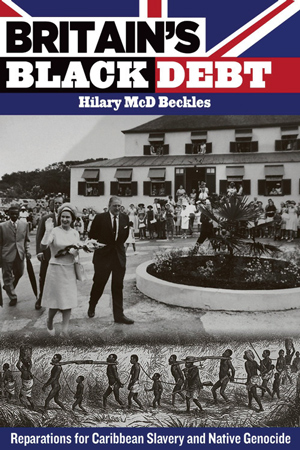Author links reparations to the developmental needs of the African diaspora
By FinalCall.com News | Last updated: Apr 24, 2014 - 11:15:41 AMWhat's your opinion on this article?
Sir Hilary Beckels is currently the Chairman of the CARICOM Reparations Commission and Pro Vice Chancellor of the Cave Hill Campus of the University of the West Indies, Barbados. He is also as a member of the Executive Board of the Association for the Worldwide African Diaspora (ASWAD). He was the leader of the delegation from Barbados at the 2001 World Conference Against Racism in Durban, South Africa. After delivering the keynote message at the “Revitalizing the Reparations Movement” summit in Chicago April 19, he sat down with The Final Call’s Ashahed M. Muhammad to discuss his most recent book “Britain’s Black Debt: Reparations for Caribbean Slavery and Native Genocide.”
The book takes a comprehensive approach to the development of reparations as a regional and international process.

Ashahed M. Muhammad, The Final Call (FC:) Thank you for your words today. Please give me an overview of your book “Britain’s Black Debt: Reparations for Caribbean Slavery and Native Genocide.” How did it come about? What prompted you to write it?
Sir Hillary Beckels (SHB:) The book is a reaction to the ten-point plan which the British use in Durban, South Africa as to why we are not entitled to reparations. They came with a ten-point plan against us. The book is really written as a response to them.
FC: And how long has the book been out?
SHB: The book has been out for six months.
FC: What has been the response? Have you sent it to any governments?
SHB: Yes, we’ve sent it to most of the governments of the Caribbean and the Black world. And I’ve noticed a conversation is going on. It is doing its job.
FC: Who is the book’s audience? Is it your common person? People simply interested in the topic who’d like to know what’s going on or are you targeting a high-level academic type person who is perhaps already studying the topic or conducting research?
SHB: It is a scholarly work but written in a language that the common man can understand, but yes, it is a work of scholarship. At the same time the language used, the words I have used is language that is not technical, not complicated and accessible to anyone.
FC: There are some nations you mentioned in your speech that have already declared that Blacks throughout the diaspora can repatriate, what were they?
SHB: Ethiopia, South Africa, Gambia, Senegal, Nigeria and Benin.
FC: I know there is a lot that goes into the decision-making and these high-level diplomatic discussions, but do you believe that this movement will achieve ultimate success? Do you have a time frame for action?
SHB: I have confidence that the prime ministers can have that conversation and bring it home. Once we have that summit, I think our prime minister’s will succeed. We’re hoping for the summer. We have to write to the governments and they have to respond. We are hoping for the summer.
FC: Thank you. We will stay updated.
INSIDE STORIES AND REVIEWS
-
-
About Harriett ... and the Negro Hollywood Road Show
By Rabiah Muhammad, Guest Columnist » Full Story -
Skepticism greets Jay-Z, NFL talk of inspiring change
By Bryan 18X Crawford and Richard B. Muhammad The Final Call Newspaper @TheFinalCall » Full Story -
The painful problem of Black girls and suicide
By Charlene Muhammad -National Correspondent- » Full Story -
Exploitation of Innocence - Report: Perceptions, policies hurting Black girls
By Charlene Muhammad -National Correspondent- » Full Story -
Big Ballin: Big ideas fuel a father’s Big Baller Brand and brash business sense
By Bryan Crawford -Contributing Writer- » Full Story






 Click Here Stay Connected!
Click Here Stay Connected!








